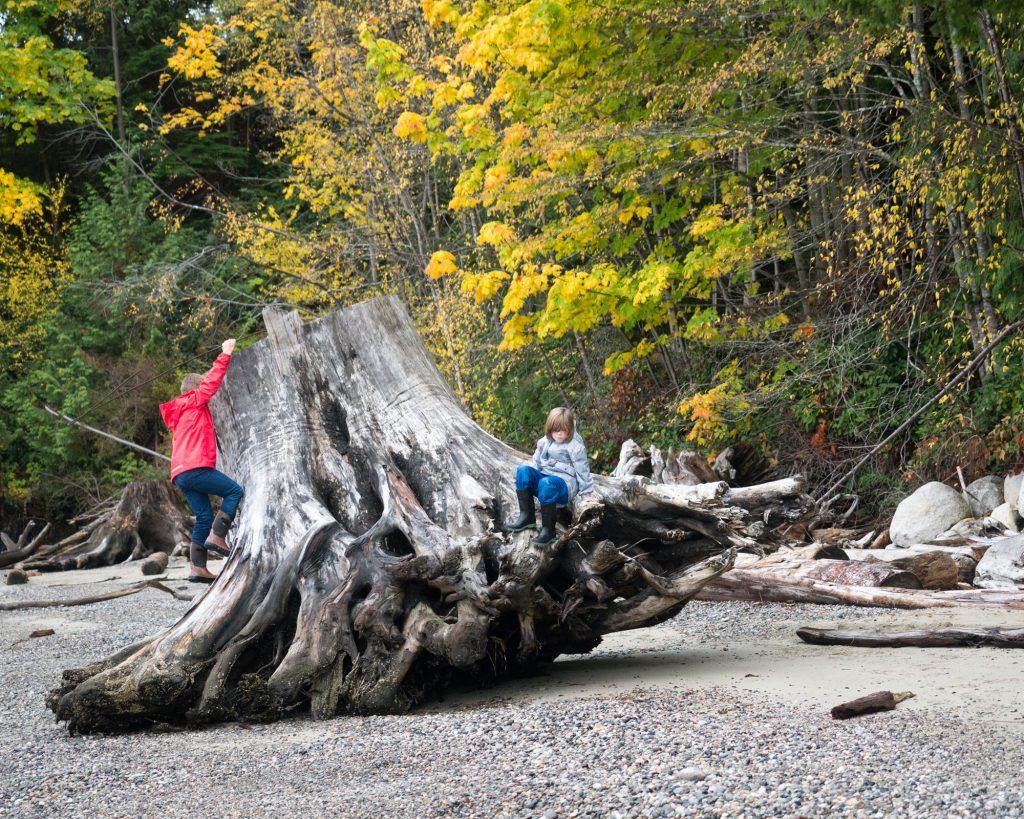
Near our home there’s a forest that we enjoy exploring. At the end of a ravine there lies a fallen tree. It spans across the distance of the ravine, from one end to the other. The tree is solid, but falling would hurt, a lot. Nevertheless, the challenge is there and my kids must take it, every time. They’ve crossed the log many times, but each time they do I hold my breath in anticipation… and to stop myself from blurting out “Be Careful!” a hundred times over.
Saying “Be Careful!” to children is probably one of the least helpful things we can say to them. First of all, it’s not specific enough. “Be Careful!” could mean “watch out for the poison ivy!” or “watch out the sky is falling!”. When you tell a child “Be Careful!” it usually doesn’t get the response you’re hoping for, either they’ll give you a look of confusion (“what’s there to be afraid of?”), ignore you (“this isn’t scary!”) or start crying (“something really bad is about to happen!”).
The other problem with saying “Be Careful!” is that it instills fear. It teaches kids that they should avoid taking risks, trying new things and making mistakes because bad things could happen, an yes bad things can happen, but kids need to engage in risky and challenging play for healthy growth and development.1

Breaking the Habit!
Imagine this scenario: Your child is climbing up a small tree and the slim branches are bowing under her weight. In a flash your brain calculate multiple scenarios, all of them end badly. Even though your child isn’t in immediate danger you want to call out “Be Careful!”, here’s what you can do instead:
STOP: Notice what you are about to say and tell your brain to “STOP!” or “PAUSE”.
BREATHE: Acknowledge how you feel and take a deep controlled breath.
REFLECT: Look at the situation with fresh eyes and ask yourself:
- What is the potential for serious harm?
- Why does this situation make me feel uncomfortable?
- What skills is my child learning right now?
RESPOND: There isn’t one right response for every situation. If your child is in danger by all means do act quickly! However, some situations might require you to do nothing and other situations might require you to help your child foster awareness or problem solve.
Fostering Awareness
My youngest child isn’t as sure footed as his older siblings. He tends to trip and fall much more. I think it’s because he’s always trying so hard to keep up. When we’re out hiking we explore places with steep cliffs, boulder fields, slippery stones and loose rock. Lots of risks! We talk about his feet a lot on these hikes: “Try moving your feet slowly over this area”, “Notice how these rocks are wet?” and “Do your feet need a rest?”. Slowly he’s becoming just as sure footed as the rest of us.
Every time you want to say “Be Careful!” see it as an opportunity to help your child foster greater awareness of their environment and their bodies. Try saying:
- Notice how… these rocks are slippery, the log is rotten, that branch is strong.
- Do you see… the poison ivy, your friends nearby?
- Try moving… your feet slowly, carefully, quickly, strongly.
- Try using your… hands, feet, arms, legs.
- Can you hear… the rushing water, the singing birds, the wind?
- Do you feel… stable on that rock, the heat from the fire?
- Are you feeling… scared, excited, tired, safe?
Encouraging Problem Solving
The other day I walked into my backyard and my two children were having an imaginary battle with two cultivators (rakes with three pointy prongs!) while swinging on swings. I wanted to blurt out “AH! YIKES! BE CAREFUL!!” but after taking deep breath I said “It looks like you’re having a very intense battle, but those tools are meant for gardening, what could you use instead?”. They put the tools away, found some stick and continued their adventure.
It’s important that we let our kids engage in risky or challenging play because it’s a great way for them to practice problem solving skills. Help them out by asking:
- What’s your plan… if you climb that boulder, cross that log?
- What can you use… to get across, for your adventure?
- Where will you… put that rock, climb that tree, dig that hole?
- How will you…. get down, go up, get across?
- Who will… be with you, go with you, help you if?

Download the FREE PDF here: What to Say to Kids Instead of “Be Careful!” (PDF)
Want more ideas for raising outdoor kids? Join the Backwoods Mama Newsletter!
Leave this field empty if you're human:https://backwoodsmama.com/2018/12/30-inspirational-parenting-books-for-raising-outdoor-kids.html

- What is the Relationship between Risky Outdoor Play and Health in Children? A Systematic Review


